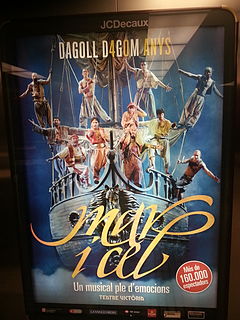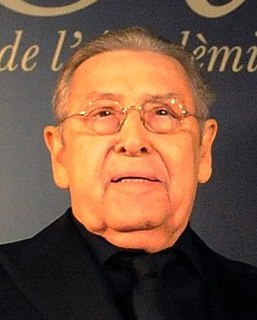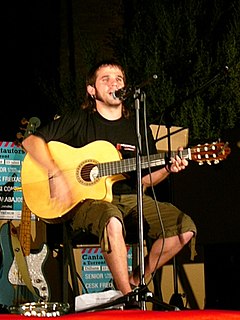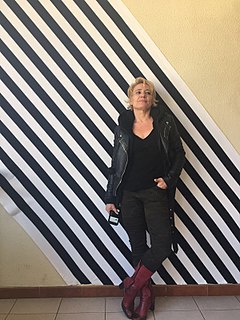Related Research Articles

VilaWeb is a Catalan-language web portal and daily news outlet, founded in May 1995 by the journalists Vicent Partal and Assumpció Maresma. It was the first online medium produced completely in Catalan, and the first news media in Spain to be based entirely online.

Dagoll Dagom is a Catalan theatre company founded in 1974, mostly dedicated to musical theater. They have performed around 5,000 times in Europe and South America. Dagoll Dagom have also created television series and released soundtrack albums. In 2015 they received the Joan Coromines Prize.

The Popular Unity Candidacy is a left-wing to far-left pro-Catalan independence political party active primarily in Catalonia, where it has political representation, but also in other autonomous communities in Spain it considers to belong to the Catalan Countries. The CUP traditionally has focused on municipal politics, and is made up of a series of autonomous candidatures that run in local elections. Its presence is strongest in Catalonia proper.

Vicent Partal is a spanish journalist and director of VilaWeb. He has also worked in El Temps, Diari de Barcelona, TVE, Catalunya Ràdio, El Punt, and La Vanguardia, among others. He is considered an Internet pioneer.
Jordi Bosch i Palacios is a Spanish actor.

Jordi Dauder i Guardiola was a Spanish actor. Dauder was a veteran actor with a prolific career that includes over a hundred films, plays and television series.
The Prudenci Bertrana prize is a literary award for novels written in Catalan. It has been awarded annually since 1968 in honour of the Catalan author Prudenci Bertrana (1867–1941). The winner receives €42,000, and the prize is considered one of the most prestigious awards in Catalan literature.
Ara is a Catalan daily newspaper that began publication on 28 November 2010, coinciding with the Catalan parliamentary elections. It is the third most read daily newspaper in Catalonia, and the most read daily newspaper written exclusively in the Catalan language. Its regional edition, Ara Balears, is the most popular Catalan language newspaper on the Balearic Islands. ARA's online edition had nearly 3.2M visitors in September 2017, making it the most popular online newspaper in Catalan language.
The Premi d'Honor de les Lletres Catalanes is an award instituted by Omnium Cultural since 1969 to recognize a person by their scientific or literary work, written in Catalan language, the importance of their work and his/her significant contribution to cultural life of the Catalan Countries.
The Premi Sant Jordi de novel·la is an award for Catalan language literature, given by Òmnium Cultural and Enciclopèdia Catalana.
The Public Diplomacy Council of Catalonia – previously known as the Patronat Catalunya Món – is a public-private consortium set up by the Catalan government, the Generalitat. It is devoted to promoting international awareness of Catalonia within the international community through public diplomacy tools. Albert Royo i Mariné was the secretary general of the Diplomacy Council from 14 February 2013 to October 27, 2017 when the government of Spain decided to close the consortium in application of article 155 of the Spanish Constitution. Its creation has been controversial, since the constitution reserves external action to the government of Spain exclusively. With the arrival of the new government of the Generalitat, the President Quim Torra convened the first meeting of its board of trustees since the beginning of the process of liquidation. With this announcement, the liquidation of the consortium was terminated and the process of reactivation started. In December 2018 its board of trustees appointed Ms. Laura Foraster as the new secretary general of Diplocat.

Julià de Jòdar i Muñoz, is a Spanish writer in Catalan.

Left Movement is a social-democratic, pro-independence political party in Catalonia. The party was founded in November 2014 from the merger of New Catalan Left (NECat) and Catalonia Movement, which had both been formed by dissident members of the Socialists' Party of Catalonia (PSC) who were dissatisfied with what they saw as the party's lack of support for the independence movement. Its founders included Marina Geli and Ernest Maragall (NECat), but both have ever since left for other parties—Geli joined the Together for Catalonia alliance ahead of the 2017 Catalan regional election, whereas Maragall defected to Republican Left of Catalonia (ERC) in 2018.

Joan Triadu was a Catalan literary critic, academic and writer. A cultural and resistant anti-Francoist activist, he participated in many significant Catalan cultural projects of the 20th century such as the Serra d'Or magazine, the magazine Ariel, Ariel, the newspaper Today or Òmnium Cultural. He was the pioneer in the post-war Catalan courses. In the role of pedagogue, he was the general director of the Cultural Institution of the CIC, an entity that created the Escola Thau Barcelona in 1963 and the Escola Thau Sant Cugat in 1996.
Francesc Orella i Pinell is a Spanish actor of cinema, television, theater and dubbing mainly known for his title role in the series Merlí on TVC.

Francesc Freixas i Morros is a Spanish singer-songwriter. Freixas has released a sampler, six albums, and a series of covers of international singer-songwriters as a contribution to the revitalization of the Protest song in the Catalan-speaking countries.
Joan Josep Guillén i Zambrano is a draftsman, painter, scenographer, and professor of performing arts.

Sol Picó Monllor is a Spanish dancer and choreographer. She has studied Spanish dance, ballet, and contemporary dance, and combines different techniques and languages in her productions in a groundbreaking way. In 1993 she created the Sol Picó Company, with which she has become one of the most heterodox choreographers and dancers of the Spanish contemporary scene. She has received numerous awards, including 10 Premios Max, the National Dance Award of Catalonia (2004), the City of Barcelona Dance Award (2015) and the National Dance Award of Spain (2016).
Joan Maria Pujals i Vallvé is a Catalan politician, counselor of the Generalitat of Catalonia and a Member of the Parliament of Catalonia in the fourth, fifth and sixth legislatures.

Josep Termes i Ardèvol was a Catalan historian.
References
- ↑ "Els Butaca" Archived 2016-04-06 at the Wayback Machine , blurb explaining the awards' history on the official website (in Catalan). Accessed 19 May 2016.
- ↑ "Sinopsi de XV Premis Butaca de Teatre i Cinema de Catalunya" (Synopsis of the 15th Butaca Theater and Cinema Awards of Catalonia) Archived 2017-10-07 at the Wayback Machine , by Glòria Cid and Toni Martín, Teatral.net, revista digital d'arts escèniques, 2009 (in Catalan). Accessed 19 May 2016.
- ↑ See official website.
- ↑ "Vota" (Vote), official website (in Catalan). Accessed 19 May 2016.
- ↑ "10è aniversari dels Premis Butaca de Teatre i Cinema de Catalunya" (10th Anniversary of the Butaca Theater and Cinema Awards of Catalonia), Premià de Mar City Council, 2 Nov. 2004 (in Catalan). Accessed 19 May 2016.
- ↑ "16th Butaca Awards" (PDF) (in Catalan).
- ↑ "Els XIV premis Butaca de teatre i cinema assoleixen un rècord de participació amb més de 7.000 votants" (The 14th Butaca Theater and Cinema Awards attain record participation with over 7000 voters), Corporació Catalana de Mitjans Audiovisuals, 17 Nov. 2008 (in Catalan). Accessed 19 May 2016.
- ↑ "Edicions anteriors" (Previous Editions) Archived 2016-06-04 at the Wayback Machine , official website (in Catalan). Accessed 19 May 2016.
- ↑ associats, Partal, Maresma i. "VilaWeb". VilaWeb.cat (in Catalan). Retrieved 2018-08-27.
- ↑ associats, Partal, Maresma i. "VilaWeb". VilaWeb.cat (in Catalan). Retrieved 2018-08-27.
- ↑ "Belbel arrasa als premis Butaca 2003". www.laxarxa.com. Retrieved 2018-08-27.
- ↑ 324cat. "Rosa Maria Sardà i Ramon Madaula, escollits pel públic com els millors actors". CCMA (in Catalan). Retrieved 2018-08-27.
- ↑ 324cat. ""Forasters", de Sergi Belbel, el gran triomfador dels Premis Butaca de Teatre i Cinema". CCMA (in Catalan). Retrieved 2018-08-27.
- ↑ associats, Partal, Maresma i. "'Antígona', d'Oriol Broggi, millor muntatge i millor direcció dels Premis Butaca". VilaWeb.cat (in Catalan). Retrieved 2018-08-27.
- ↑ associats, Partal, Maresma i. "'Plataforma', de Calixte Bieito, triomfadora dels Premis Butaca". VilaWeb.cat (in Catalan). Retrieved 2018-08-27.
- ↑ "L'obra "Germanes" rep el Premi Butaca al millor muntatge teatral" (in Catalan). 324.cat.
- ↑ "'La casa de Bernarda Alba', premi Butaca al millor espectacle teatral" (in Catalan). Archived from the original on 2012-08-04.
- ↑ "16th Butaca Awards" (PDF) (in Catalan).
- ↑ "16th Butaca Awards winners" (PDF) (in Catalan).
- ↑ "Els Premis Butaca de Teatre premien 'Agost' i 'Coses que dèiem avui'" (in Catalan). Ara. 22 November 2011.
- ↑ "'Incendis' i 'La vampira del Raval', estrelles dels Premis Butaca". Ara.cat (in Catalan). Retrieved 2018-08-27.
- ↑ "'Els feréstecs', triomfadora dels Premis Butaca amb 5 guardons". Ara.cat (in Catalan). Retrieved 2018-08-27.
- ↑ "'L'orfe del clan dels Zhao' fa el ple i s'endú sis estatuetes dels Premis Butaca". Ara.cat (in Catalan). Retrieved 2018-08-27.